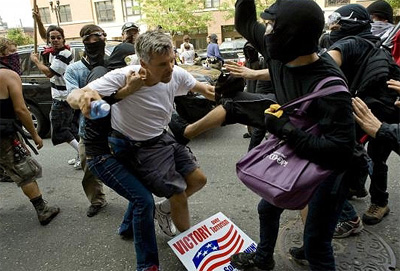Since Minneapolis had a good chance of welcoming anarchists the Democratic National Convention in 2012, today is a good day to revisit the role of the media in the 2008 Republican National Convention.
It comes from former NPR ombudsman Jeff Dvorkin, who wonders whether the news media and law enforcement are occasionally too tight. In a blog post today, Dvorkin applauds Utah newspapers who refused to run a list of individuals, who are allegedly in the country illegally.
He says that’s in stark contrast to newspapers in Toronto where the G20 summit brought out the anarchists. Subsequently, the police asked the media to publish photos of people allegedly responsible for the some violence and damage, to help identify and catch them.
Some photos show individuals clearly in the act of trashing a police car. That would appear to be enough evidence to convict. (I can imagine what a good defense lawyer might say: “Your honor, my client was only trying to retrieve her property which had been thrown onto the roof of the police vehicle…”).
Others photos are “head and shoulder” shots released by the Toronto police. They don’t reveal any evidence of law-breaking, beyond the say-so of the authorities.
While the damage to property in parts of downtown Toronto was considerable and the actions of hooligans, reprehensible, is it the role of the media to act as police agents? Are reporters being sufficiently skeptical and asking the police those four most important words: “How do you know?” Or is this an instance when citizen journalism descends into vigilante journalism?
This sounds a little too familiar for comfort. In the aftermath of the St. Paul violence in 2008, local authorities did the same thing.
St. Paul Police and the Ramsey County Sheriff’s Office released this photo, for example:

And the media — and that includes News Cut, for the record — printed it. The difference, however, is that in this case the police weren’t looking for the ID of the attacker; they were looking for the ID of the victim.
But is that different from Dvorkin’s complaint. Is this an ethical violation?
